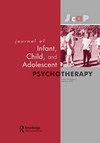探讨父母对青少年抑郁症治疗中途退出的看法
Q3 Psychology
Journal of Infant, Child, and Adolescent Psychotherapy
Pub Date : 2023-04-03
DOI:10.1080/15289168.2023.2191167
引用次数: 0
摘要
谈话疗法是治疗青少年抑郁症的第一线疗法,但其辍学率却很高。尽管父母被认为是儿童心理健康治疗的主要利益相关者,但缺乏关于他们对青少年辍学看法的定性研究。本研究旨在探讨家长对其青少年子女为何退出治疗的看法。研究人员从一个更大的数据集中有意选择了12位青少年子女退出治疗的父母进行访谈,以探索他们对孩子停止接受治疗的原因的理解。访谈采用主题分析进行分析,确定了五个关键主题:治疗的实际障碍;青少年与治疗师合作的意愿;青少年与治疗师之间的关系困难;感知治疗的有用性;父母不知道他们的孩子为什么停止治疗。让父母参与整个治疗过程可能会有所帮助,因为他们在建议如何最好地支持他们的孩子方面处于独特的地位。服务机构应在治疗开始前向青少年提供有关治疗类型和不同治疗师的信息。治疗关系中的困难应该在当下解决,以减少破裂,从而减少退出的风险。本文章由计算机程序翻译,如有差异,请以英文原文为准。
Exploring Parental Perspectives on Dropout from Treatment for Adolescent Depression
ABSTRACT Talking therapies are the first line of treatment for adolescent depression, yet dropout rates are high. Despite parents being considered primary stakeholders in a child’s mental health treatment, there is a lack of qualitative research on their perspectives on adolescent dropout. This study aimed to explore parents’ perspectives on why their adolescent children dropped out of therapy. Interviews with 12 parents whose adolescent children had dropped out of therapy were purposively selected from a larger dataset to explore their understanding of why their children had stopped going to therapy. Interviews were analyzed using thematic analysis and five key themes were identified: practical barriers to therapy; adolescent’s readiness to work with the therapist; relationship difficulties between adolescent and therapist; perceived helpfulness of the therapy; and parents being unaware of why their child ended therapy. Involving parents throughout the therapeutic process could be helpful as they are uniquely positioned to suggest how best to support their child. Services should provide information on the types of therapy, and different therapists, available to adolescents prior to treatment starting. Difficulties in the therapeutic relationship should be addressed in the moment to reduce rupture and, therefore, risk of drop out.
求助全文
通过发布文献求助,成功后即可免费获取论文全文。
去求助
来源期刊

Journal of Infant, Child, and Adolescent Psychotherapy
Psychology-Clinical Psychology
CiteScore
1.70
自引率
0.00%
发文量
37
 求助内容:
求助内容: 应助结果提醒方式:
应助结果提醒方式:


